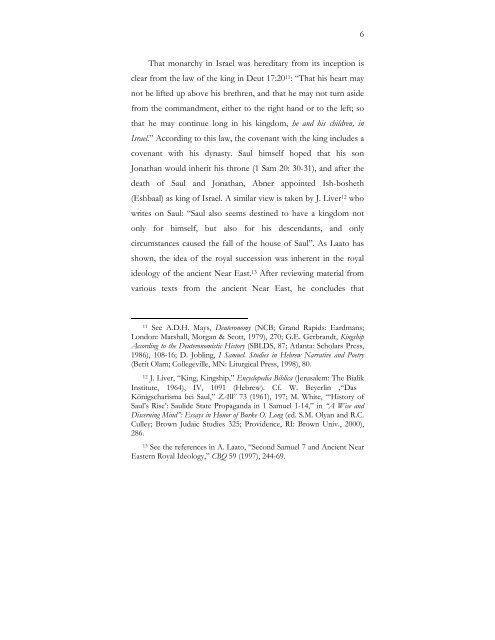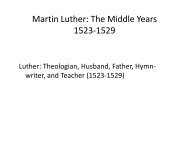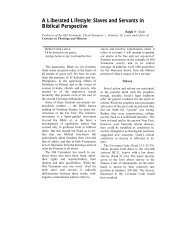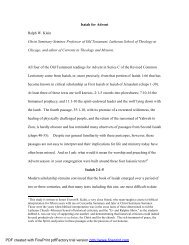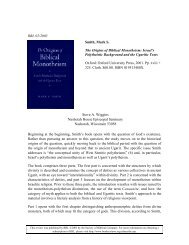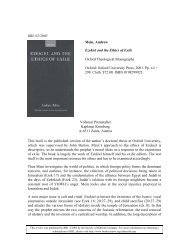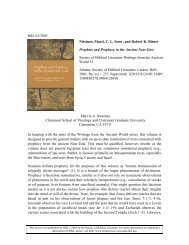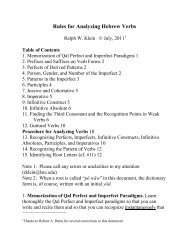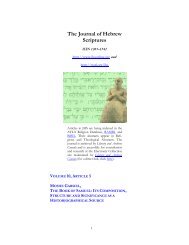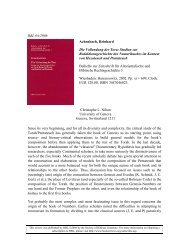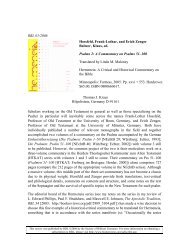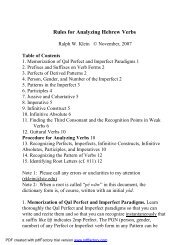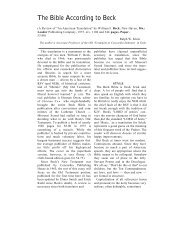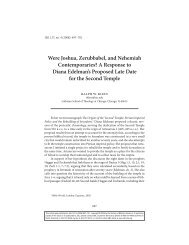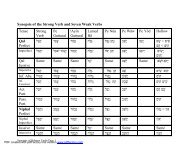could saul rule forever? a new look at 1 samuel 13:13-14
could saul rule forever? a new look at 1 samuel 13:13-14
could saul rule forever? a new look at 1 samuel 13:13-14
Create successful ePaper yourself
Turn your PDF publications into a flip-book with our unique Google optimized e-Paper software.
Th<strong>at</strong> monarchy in Israel was hereditary from its inception is<br />
clear from the law of the king in Deut 17:20 11: “Th<strong>at</strong> his heart may<br />
not be lifted up above his brethren, and th<strong>at</strong> he may not turn aside<br />
from the commandment, either to the right hand or to the left; so<br />
th<strong>at</strong> he may continue long in his kingdom, he and his children, in<br />
Israel.” According to this law, the covenant with the king includes a<br />
covenant with his dynasty. Saul himself hoped th<strong>at</strong> his son<br />
Jon<strong>at</strong>han would inherit his throne (1 Sam 20: 30-31), and after the<br />
de<strong>at</strong>h of Saul and Jon<strong>at</strong>han, Abner appointed Ish-bosheth<br />
(Eshbaal) as king of Israel. A similar view is taken by J. Liver12 who<br />
writes on Saul: “Saul also seems destined to have a kingdom not<br />
only for himself, but also for his descendants, and only<br />
circumstances caused the fall of the house of Saul”. As La<strong>at</strong>o has<br />
shown, the idea of the royal succession was inherent in the royal<br />
ideology of the ancient Near East. <strong>13</strong> After reviewing m<strong>at</strong>erial from<br />
various texts from the ancient Near East, he concludes th<strong>at</strong><br />
11 See A.D.H. Mays, Deuteronomy (NCB; Grand Rapids: Eardmans;<br />
London: Marshall, Morgan & Scott, 1979), 270; G.E. Gerbrandt, Kingship<br />
According to the Deuteronomistic History (SBLDS, 87; Atlanta: Scholars Press,<br />
1986), 108-16; D. Jobling, I Samuel. Studies in Hebrew Narr<strong>at</strong>ive and Poetry<br />
(Berit Olam; Collegeville, MN: Liturgical Press, 1998), 80.<br />
12 J. Liver, “King, Kingship,” Encyclopedia Biblica (Jerusalem: The Bialik<br />
Institute, 1964), IV, 1091 (Hebrew). Cf. W. Beyerlin ,“Das<br />
Königscharisma bei Saul,” ZAW 73 (1961), 197; M. White, “‘History of<br />
Saul’s Rise’: Saulide St<strong>at</strong>e Propaganda in 1 Samuel 1-<strong>14</strong>,” in “A Wise and<br />
Discerning Mind”: Essays in Honor of Burke O. Long (ed. S.M. Olyan and R.C.<br />
Culley; Brown Judaic Studies 325; Providence, RI: Brown Univ., 2000),<br />
286.<br />
<strong>13</strong> See the references in A. La<strong>at</strong>o, “Second Samuel 7 and Ancient Near<br />
Eastern Royal Ideology,” CBQ 59 (1997), 244-69.<br />
6


